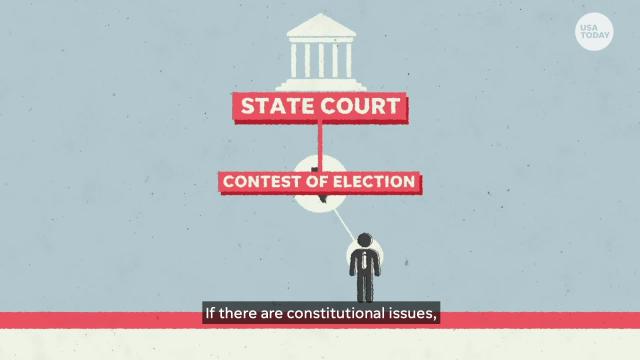When was the longest election in modern US history? And could 2020 take even longer?

WASHINGTON – Thirty-five days. That’s how long it took — from the ballot boxes to Democratic presidential nominee Al Gore conceding the election — for voters to know who won the 2000 presidential election.
The 2000 election is the longest in contemporary American history in terms of "elapsed time in days," Michael W. Traugott, a professor emeritus of political science at the University of Michigan, told USA TODAY.
“Generally speaking, this doesn't occur very often — fortunately,” he said, referring to long, drawn-out election processes.
But 2000 was a special case: It was marred by plenty of logistical voting issues, including a faulty ballot design, allegations of miscounts and court debates, starting on Election Day 2000, Nov. 7.
Not only did the Gore campaign's request for a manual recount slow things down due to the efficiency (or lack thereof) of hand-counting ballots, said Matthew Schmidt, an associate professor of national security at the University of New Haven, the request was also contested by the Bush campaign despite approval from the Florida Supreme Court.
Remember 'hanging chads'?: Here's a look back at America's contested elections.
The case made its way up to the U.S. Supreme Court, which overturned the Florida Supreme Court’s ruling to conduct a manual recount due to it violating the Equal Protection Clause.
The court also determined in a controversial 5-4 ruling that the Gore campaign had run out of time to propose any new recount plans due to the “safe harbor” clause in the United States Code. That meant that the case ended Dec. 12, exactly five weeks after Election Day 2000.
It still remains a contentious election, to this day — determined by a difference of 537 votes.
Could the 2020 election take as long as 2000?
The chances are slim, but the possibility is always there.
“It would have to depend on the viability of the lawsuits that the Trump campaign is filing,” Traugott explained to USA TODAY.
So far, the Trump campaign has filed court actions in many of the swing states the nation has watched breathlessly in the past few days, including Georgia, Michigan and Pennsylvania. Those cases have been thrown out.
Election 2020: Trump sues to stop vote-counting in Michigan, Pennsylvania; claims late ballots mixed with others in Georgia
“Most of them seem to be without merit, he said, “but it would only take one to engage the state and federal courts to push out the calendar.”
Schmidt said the Trump campaign would have to show "material evidence" of any wrongdoing in terms of ballot counting.
"You can’t just suppose or assume voter fraud somewhere," Schmidt said. "You have to show it." That's a high bar, he said, especially due to the "extraordinary conditions" caused by the COVID-19 pandemic on voters.
Multiple state officials have criticized the Trump campaign's assorted voting count challenges.
Pennsylvania Gov. Tom Wolf described attempts to stop the counting of votes as “simply wrong.”
“It goes against the most basic principles of our democracy,” Wolf said. “I’m going to fight like hell to protect to the vote of every Pennsylvanian.”
Elsewhere, Arizona's Secretary of State Katie Hobbs said that Trump has no "legal pathway" to challenge the state's votes, which are leaning toward Biden.
Contributing: Dave Boucher, Kevin McCoy, Kevin Johnson, USA TODAY Network.
Follow Joshua Bote on Twitter: @joshua_bote.
This article originally appeared on USA TODAY: What was the longest presidential election in US history?